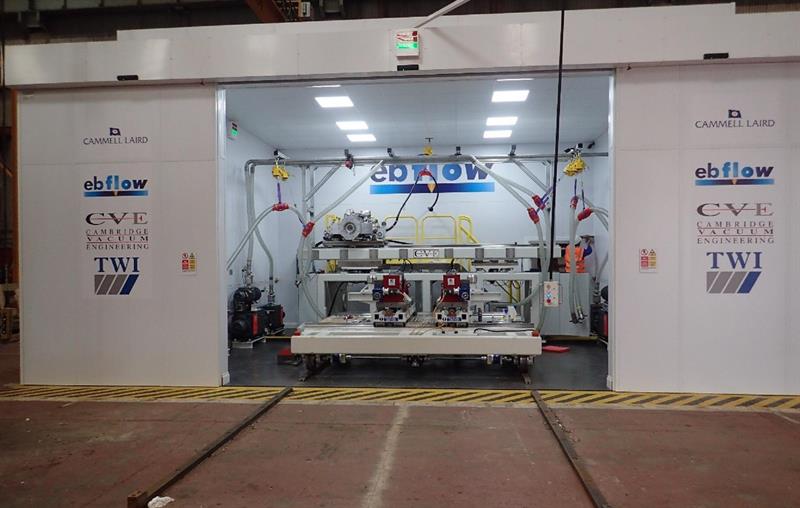TWI, CVE and Cammell Laird have collaborated to develop production equipment and methods which have been demonstrated in the fabrication of the UK’s first full-size MMR vessel segment.
Supported by Innovate UK, the EBManPower project has demonstrated a low cost and rapid manufacturing solution of thick section vessels for nuclear and other industries, using existing UK logistical and manufacturing capabilities. EBManPower focussed on using the Ebflow system, deployed at the Cammell Laird’s shipyard in Birkenhead, to demonstrate the viability of cost-effective MMR fabrication.
Electron beam welding has been used for the nuclear and aerospace industries for decades. This is the first time that a commercially available local vacuum EB system has been deployed in an industrial environment.
Project partner Aquasium Technology commercialised local beam welding technology, which was developed initially at TWI. It looks to greatly reduce the time and cost of welding thick section structures for use in the nuclear power industry. A cost-effective manufacturing process for thick-section structures is currently limited by welding times, with a typical 40m-long, 60mm-thick monopile taking ~6,000 hours of ‘arc-on’ welding time. Faster and cheaper fabrication would help grow revenues and exports while also creating high value jobs manufacturing and low-carbon energy sectors.
Aquasium Technology has industrialised the design and robust manufacture of the ‘EBFlow’ system, which can reduce welding times from 6,000 to less than 200 hours of welding time, the system still needed to be validated within a large-scale fabrication facility to ensure that cost reductions of over 85% can be maintained.

Lead project partner, ship-builder Cammell Laird have been extending its portfolio into the marine and energy sectors, becoming partners in the U-Battery nuclear micro modular reactor (MMR) system. The EBFlow system is focussed on a number of specialist pressure vessels and has been deployed at Cammell Laird’s site in Birkenhead where it has been tested to see if it can fabricate MMRs in a cost-effective manner. If achieved successfully, this process will allow for the widespread deployment of new cost-effective nuclear fission solutions to meet low-carbon energy needs within the UK and across the world.
Now, TWI reports that the EBManPower project has completed successfully. It has devised a near-net build approach, enabling large cost savings on materials through the use of rolled plates, suitable for nuclear and other vessel or tubular structures. The project has also demonstrated a feasible manufacturing technique which is up to 95% faster than other welding methods, with no consumables, filler or fumes, and finally significantly reduced health risks, labour and inspection costs of such fabrications, while offering higher productivity.



